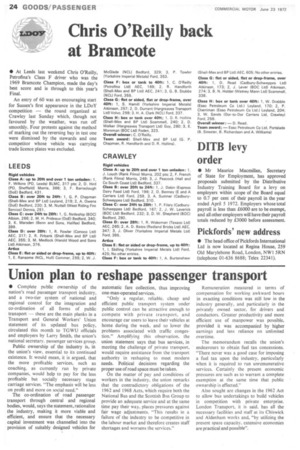Union plan to reshape passenger transport
Page 26

If you've noticed an error in this article please click here to report it so we can fix it.
• Complete public ownership of the nation's road passenger transport industry, and a two-tier system of national and regional control for the integration and co-ordination of all forms of public transport these are the main planks in a Transport and General Workers' Union statement of its updated bus policy, circulated this month to TGWU officials and employers by Larry Smith, the union's national secretary, passenger services group.
Public ownership of the industry is, in the union's view, essential to its continued existence. It would mean, it is argued, that the more profitable services, such as coaching, as currently run by private companies, would help to pay for the less profitable but socially necessary stage carriage services. "The emphasis will be less on profit and more on social need."
The co-ordination of road passenger transport through central and regional bodies, would, says the statement, rationalize the industry, making it more viable and efficient, and ensure that the necessary capital investment was channelled into the provision of suitably designed vehicles for automatic fare collection, thus improving one-man-operated services.
"Only a regular, reliable, cheap and efficient public transport system under public control can be attractive enough to compete with private transport, and encourage car users to leave their vehicles at home during the week, and so lower the problems associated with traffic congestion." Amplifying this observation, the union statement says that bus services, in meeting the challenge of private transport, would require assistance from the transport authority in reshaping to meet modern needs. Political decisions regarding the proper use of road space must be taken.
On the matter of pay and conditions of workers in the industry, the union remarks that the contradictory obligations of the 1962 and 1968 Acts, which require both the National Bus and the Scottish Bus Group to provide an adequate service and at the same time pay their way, places pressures against fair wage adjustments. “This results in a failure of the industry to be competitive in the labour market and therefore creates staff shortages and worsens thc services. Remuneration measured in terms of compensation for working awkward hours in exacting conditions was still low in the industry generally, and particularly in the privately owned sector, for drivers and conductors. Greater productivity and more efficient use of manpower was possible, provided it was accompanied by higher earnings and less reliance on unlimited overtime.
The memorandum recalls the union's endeavours to obtain fuel tax concessions. "There never was a good case for imposing a fuel tax upon the industry, particularly when it is required to run unremunerative services. Certainly the present economic pressures are such as to warrant a complete exemption at the same time that public ownership is effected."
Also sought are changes in the 1962 Act to allow bus undertakings to build vehicles in competition with private enterprise. London Transport, it is said, has all the necessary facilities and staff at its Chiswick and Aldenham works and, "by utilizing the present spare capacity, extensive economies are practical and possible".












































































































